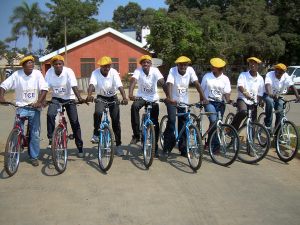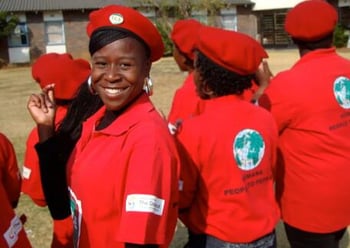Developing countries have some of the highest rates of epidemic diseases like AIDS, malaria, and tuberculosis (TB). Many with these diseases do not only lack access to proper treatment, and they are also often stigmatized within their own community. Prevention is key in slowing the spread of communicable diseases, and education is the first step.
More than 20 million people throughout Mozambique, Angola, South Africa, China, Zambia, and other countries have been reached through the Total Control of the Epidemic (TCE) approach. TCE is a revolutionary disease education and prevention program that sees every individual as an essential building block in turning the tide against HIV/AIDS, TB, or malaria.
TCE educates and mobilizes individuals en masse with a door-to-door campaign that encourages lifestyle changes and preventative behavior. It systematically reaches every individual and household within a prescribed area over a three-year period. The flexible model can be adapted to the needs of each targeted community to address major epidemics, including HIV/AIDs, tuberculosis, and malaria. The training and involvement of local volunteers, youth clubs, civic leaders, and other community individuals and organizations gives the project long-term sustainability. The idea is to provide sufficient knowledge and tools so that people can liberate themselves from the devastating impact of these diseases.
Structure
The program can be adapted to address different diseases, as well as the geographic and cultural needs of a region. Below is an example of how TCE is implemented to address HIV/AIDS in sub-Saharan Africa:
 TCE subdivides a region into “TCE Areas,” which are circumscribed population units of 100,000 individuals each. TCE Areas are further subdivided into fields of 2,000 individuals, averaging 250 to 400 households. Each field is assigned to a TCE field officer, whose job is to inform and counsel every individual in their field. The officers also visit schools, workplaces, and community centers.
TCE subdivides a region into “TCE Areas,” which are circumscribed population units of 100,000 individuals each. TCE Areas are further subdivided into fields of 2,000 individuals, averaging 250 to 400 households. Each field is assigned to a TCE field officer, whose job is to inform and counsel every individual in their field. The officers also visit schools, workplaces, and community centers.- The responsibilities of the field officer include:
- Living in his or her area of operation and walking or bicycling from house to house, meeting the individuals. The field officers enter into an open dialogue with each family member, mobilizing them to know their HIV status and linking them to existing health services.
- Leading individuals into taking responsibility for either staying HIV negative or, if HIV positive, taking steps to prolong healthy living and productivity while avoiding transmission of the virus.
- Establishing information centers and condom distribution sites, forming neighborhood committees to initiate campaigns and activities to promote community awareness, and spreading HIV prevention messages to the public on the radio and in literature.
- Recruiting, training, and organizing local volunteers, called “passionates,” who help educate and sensitize the community.
Prevention
 An essential part of TCE is to encourage every person who has been sexually active or otherwise potentially exposed to HIV to be tested and for everyone to know his/her HIV status. Field officers help each person to develop an individual risk reduction plan with full awareness of his/her own HIV status while also combating stigma and resistance to testing. They work towards prevention of HIV/AIDS transmission by promoting safe sex and emphasizing abstinence as the primary preventative measure to youth and those not yet married. For married persons they promote faithfulness and safe sex as the best ways to reduce risks of infection.
An essential part of TCE is to encourage every person who has been sexually active or otherwise potentially exposed to HIV to be tested and for everyone to know his/her HIV status. Field officers help each person to develop an individual risk reduction plan with full awareness of his/her own HIV status while also combating stigma and resistance to testing. They work towards prevention of HIV/AIDS transmission by promoting safe sex and emphasizing abstinence as the primary preventative measure to youth and those not yet married. For married persons they promote faithfulness and safe sex as the best ways to reduce risks of infection.
Treatment
Referrals to existing programs and services represent an essential part of the field officer’s responsibility. Pregnant women are taught about the way HIV can infect a newborn baby, urged to learn their HIV status and referred to Prevention of Mother to Child Transmission (PMTCT) services. People who are HIV positive are referred to ARV (antiretroviral) treatment services, and may also be referred to testing and treatment for opportunistic infections such as tuberculosis (TB) and sexually transmitted infections (STIs). They are given information about good nutrition and ways to prolong their years of healthy living. They are encouraged to join TCE Positive Living Clubs to support each other.
The field officers follow up with persons who test positive and offer support. In many cases the field officer will assist a person by accompanying him or her to the health center, by talking to the person’s partner to solve a problem or by setting up a TRIO. TRIOS consist of two supporters together with the person on ARV treatment who assist with treatment adherence and provide care and support.
Passionates
The field officer recruits, trains and organizes local volunteers, called “passionates,” who help educate and sensitize the community. They form Orphan Care Committees to care for orphans and vulnerable children and support their care-giving families. They arrange for home-based care for those who are sick due to AIDS. They organize Positive Living Clubs where people living with AIDS receive peer support, learn to prolong their lives through healthy living, and participate in projects such as community gardens that provide nutritious food and additional income. The passionates play a vital role in helping educate and sensitize the community in order to overcome the stigma and discrimination surrounding HIV. Some passionates who are HIV-positive set an example by revealing their own status. The passionates provide sustainability, as they are equipped to continue certain elements of the program after the three-year TCE campaign is completed, dedicating themselves to serving their community over the long term in the fight against HIV/AIDS.
TCE Compliance
When a community has reached a state of "TCE compliance" all members of the community are aware of how to remain free of the epidemic or, if they have already contracted the disease, how to live a positive and healthy life.
